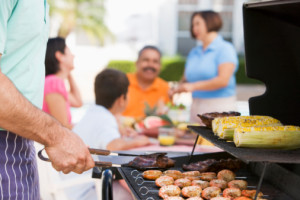Tips for a safe grilling season

“Safe grilling isn’t just about making sure your steak is cooked all the way through,” says Judy Matusky, registered dietitian at Bryn Mawr and Paoli hospitals. “It’s also about making sure the environment you’re cooking in is safe, avoiding cross-contamination, and recognizing health risks.”
Below, Matusky explores some of the most common health and safety risks you might encounter during grilling season.
Location, location, location
Location is everything when it comes to placing your grill. Grill manuals usually explain the minimum distance your grill should be away from anything, but as a general rule of thumb, keep it away from buildings, trees, fabric or other objects to avoid fires. Also, remember to keep it away from areas where people will be gathering, or where children will be running by.
Flip frequently
To kill E. coli bacteria, the USDA recommends cooking ground beef to 160 degrees. If you’re using store-bought meat, flip your burgers frequently to reduce your E. coli bacteria the most.
Serve it safely
When you’re finished grilling meat, don’t put it back on the same plate it was on when it was uncooked. Raw meat juices can transfer bacteria to cooked foods, which means even if your meat is cooked properly, you could still be sick. The same rule goes for utensils: never use the same utensils on cooked food that you used on uncooked food, unless it has been thoroughly washed with soap and water.
Don’t leave leftovers out too long
Have enough for leftovers? Make sure you refrigerate it quickly. If it’s been out for more than two hours, it’s safer to throw out food than keep it. If it’s over 90 degrees, the time span shortens to one hour. And don’t forget: leftovers expire, too. If you don’t finish a leftover within three to four days, toss it.
Beware of bristles
If you’re cleaning your grill with a brush, make sure to check and see if any bristles have been left behind. These can get stuck inside the grill and accidentally ingested, which can be dangerous. Instead of using a brush to clean, try using stainless steel or plastic tools instead.
Looking for some grilling inspiration? Check out our favorite recipes for summer grilling season.
 Content you want, delivered to your inbox
Content you want, delivered to your inbox
Want to get the latest health and wellness articles delivered right to your inbox?
Subscribe to the Well Ahead Newsletter.
